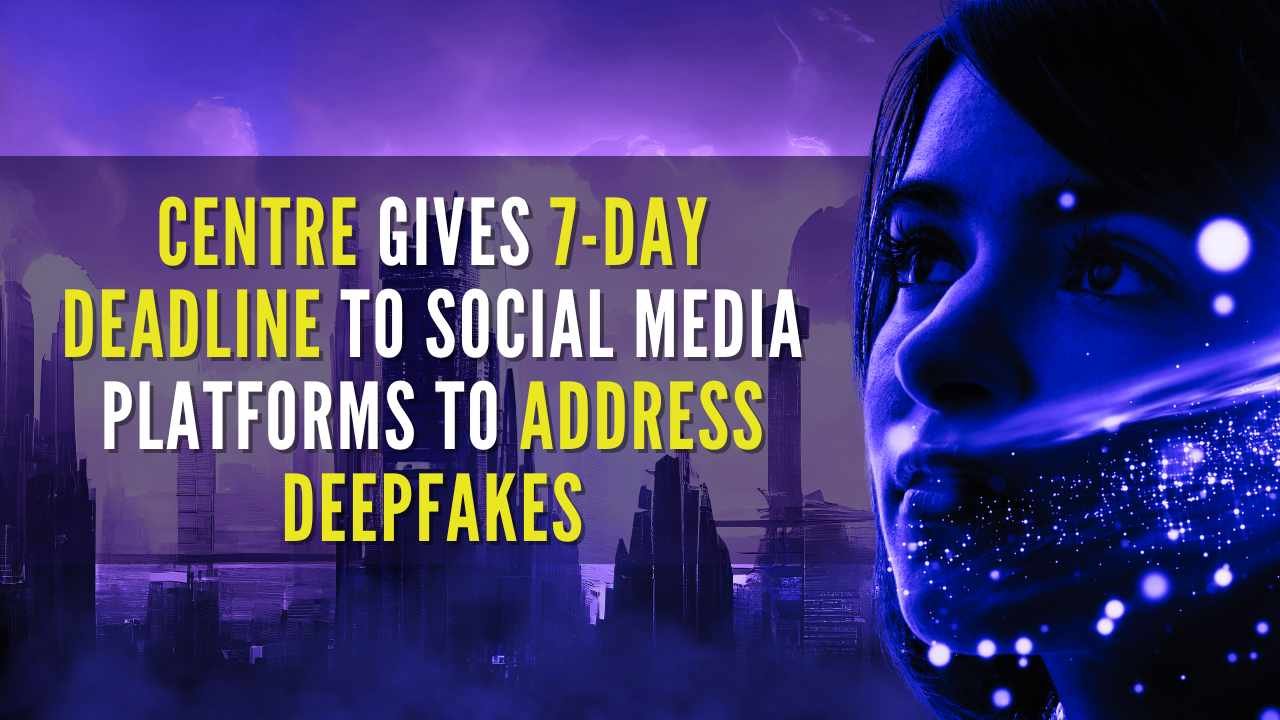India’s Call for Action Against Deepfakes on Social Media Giants: Safeguarding Reality
Deepfakes are a serious threat to the legitimacy of internet material in this digital age where technology permeates every aspect of our life. India recently sent strong warnings to Facebook and YouTube, two of the biggest social media platforms, asking them to tighten policies and guidelines to stop the proliferation of deepfakes. This action is a preemptive measure to prevent possible technology abuse and protect the accuracy of the data circulating on these platforms.
Understanding the Deepfake Predicament
The term “deepfakes,” a combination of “deep learning” and “fake,” describes content that has been artificially produced with machine learning algorithms. These algorithms are capable of altering audio and video to give the impression that people are saying or acting in ways they never would. This cutting-edge technology has sparked worries about disinformation and its effects on public confidence in digital media worldwide since it has the ability to trick viewers.
India’s Alert: The Need for Prompt Action
India’s warning letter to Facebook and YouTube emphasizes how urgent it is to combat the deepfake threat. The government is advocating for stringent procedures to detect and stop the spread of such content on these extensively utilized platforms, realizing the possible harm that these distorted media pieces can bring.
Cooperation to Create a Safer Online Environment
In order to create efficient protocols, the warning highlights how crucial it is for governments and IT corporations to work together. Cooperation will enable the development and execution of strict regulations aimed at preventing the production and spread of deepfakes.
The Global Deepfake Environment: Misinformation Proliferation
Deepfakes have the power to support disinformation operations because of their capacity to convincingly modify reality. The consequences of unregulated deepfake dissemination are wide-ranging and worrisome, ranging from disseminating misleading narratives to harming the reputations of prominent persons.
Effect on Media Credibility
The increasing sophistication of deepfakes raises questions about the reliability of digital media. The foundation of confidence in online information is undermined if viewers cannot rely on the veracity of the content they consume, which fosters skepticism and ambiguity.
Social Media Giants’ Role
Facebook’s Accountability
Facebook is one of the most popular social media sites in the world and has a significant influence on the conversation that takes place online. The request for rule reinforcement acknowledges that the platform has an obligation to protect the accuracy of the data given by its sizable user base.
The Impact of YouTube
With its prominence as a platform for video content, YouTube has enormous influence over how people consume digital media. India’s YouTube warning emphasises how strict controls must be put in place by the platform to identify and stop the spread of deepfake videos.
Difficulties with Deepfake Detection of Developing Technologies
The ongoing development of the technology itself is one of the main obstacles in the fight against deepfakes. To properly detect modified content, detection techniques need to keep up with the advancement of algorithms.
Content Scale
Every day, a huge amount of content is uploaded to websites like Facebook and YouTube, making it logistically difficult to keep an eye on and authenticate every piece of media. Using both automated technologies and human oversight is necessary for the implementation of thorough content moderation.
Techniques for Preventing Deepfakes with Enhanced AI Detection Algorithms
It is imperative to invest in cutting-edge artificial intelligence (AI) systems that can recognize minute modifications. These algorithms can detect possible deepfakes by examining patterns and irregularities in audio and video sources by utilizing machine learning.
Awareness and Education of Users
It is equally important to equip consumers with the expertise to recognize and report deepfake content. Campaigns for education can be crucial in developing a watchful online community that can identify and report questionable media.
The Way Ahead for Strengthening Law Frameworks
India’s warning serves as a reminder of the value of a strong regulatory framework in addition to being a call to action for digital titans. Laws that are clear and effective on the parties involved in the production and distribution of deepfake content can serve as a disincentive.
International Collaboration
Addressing the deepfake issue requires international collaboration due to the internet’s transnational character. Research cooperation, the exchange of best practises, and the joint development of technology solutions can strengthen the global digital landscape against the threats that deepfakes pose.
Accepting Technology-Based Remedies
Constant Improvement in Detection Technologies
The solution to the deepfake problem is a dedication to ongoing innovation. Tech businesses need to invest in cutting-edge solutions that can adjust to the changing nature of deepfake algorithms in partnership with academic institutes. Developing increasingly complex detection technologies will be essential to staying one step ahead of people who try to alter digital content.
Accountability and Transparency
Apart from technology breakthroughs, it is critical to promote accountability and openness. Social media companies must inform consumers in a clear and concise manner of the steps they are taking to prevent deepfakes. Furthermore, it is crucial to set up accountability structures that hold platforms and content producers accountable for the dissemination of harmful deepfake content.
Enforcing Strict Regulations
Facebook and YouTube need to actively contribute to the development of strict standards against deepfakes, rather than just complying with existing regulations. Governments, cybersecurity professionals, and content producers can work together to develop rules that tackle the complex problems that deepfake technology presents.
Mechanisms for User Reports
Putting in place user-friendly reporting systems is a necessary step towards enabling users to take the initiative in combating deepfakes. Users can become first responders to the dissemination of false information by using easily understood reporting mechanisms in conjunction with awareness-raising initiatives about the recognition and reporting of deepfake content.
The Creation of Content with Ethical Considerations
Developing Digital Knowledge
Developing digital literacy is the first step towards creating a strong defence against deepfakes. A more knowledgeable and perceptive online community is a result of educational activities designed to improve users’ comprehension of digital media, its possible manipulations, and the ethical issues surrounding content creation.
Conscientious AI Development
In their development procedures, AI algorithm developers ought to give ethical considerations top priority. Preventing the unexpected effects of deepfake technology requires making sure AI models are created with protections against harmful use and ethical guidelines.
Support from the government and laws imposing harsh penalties
India’s alert emphasizes how crucial official backing is in the fight against deepfakes. Strict sanctions that are implemented and enforced for individuals found guilty of producing or disseminating malicious deepfake content act as a warning and indicate that digital fraud will not be tolerated.
International Cooperation in Law
Given the international scope of the internet, international cooperation is crucial. India’s call to action may open the door for international collaboration in the creation of laws that fully combat deepfakes. A common set of guidelines and conventions can help the group fight back against the problems caused by misrepresented media.
Developing Conscientious Innovation
Tech Sector Accountability
The tech sector is more accountable for anticipating and reducing potential dangers as technology develops. Active communication with decision-makers, scholars, and the general public may help create a climate in which innovation is not only welcomed but also carried out responsibly and with consideration for the effects it will have on society.
Innovation and Security in Balance
It is a tricky but important duty to strike a balance between promoting innovation and guaranteeing security. Tech businesses should have a responsible innovation culture in which innovations are developed with a dedication to risk mitigation and a deep understanding of any potential ethical ramifications.
Final words
India has sent a strong warning to Facebook and YouTube, urging them to come together in opposition to the growing threat posed by deepfakes. It is essential to take a comprehensive approach as we negotiate the tricky junction of media, technology, and societal trust. We can create a digital environment where authenticity is valued and people can trust the content they come across by fusing technological innovation, open policies, ethical considerations, and international cooperation. The fight against deepfakes is a common obligation that calls for cooperation, creativity, and a dedication to maintaining the integrity of the digital space. It is not only a problem for individual platforms.






